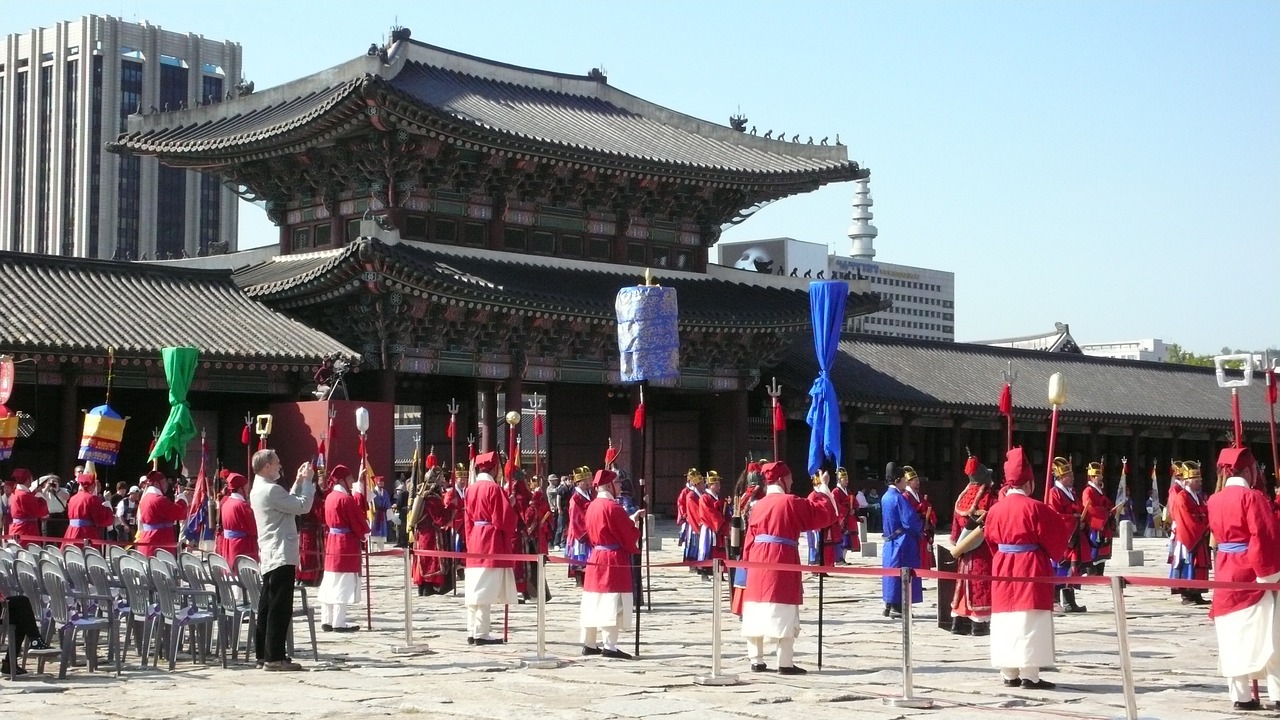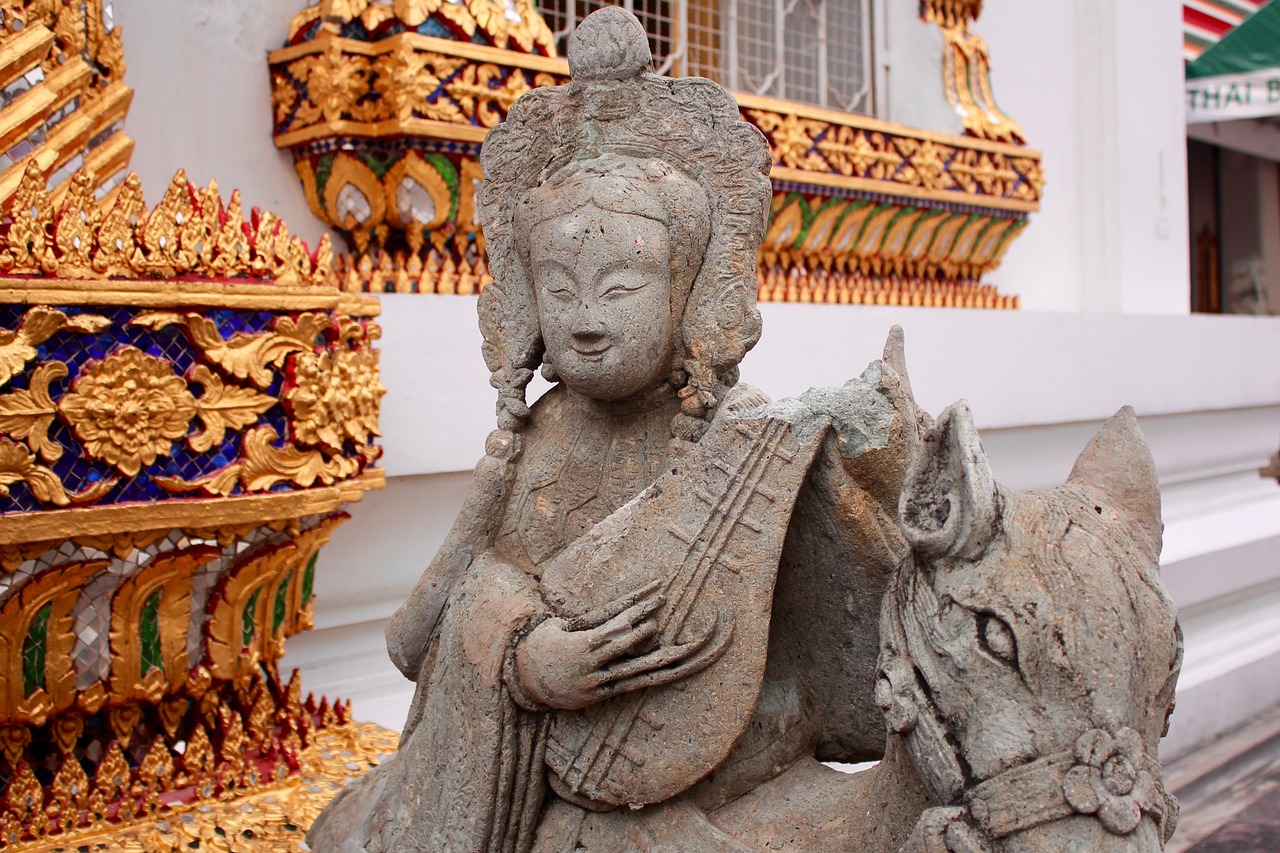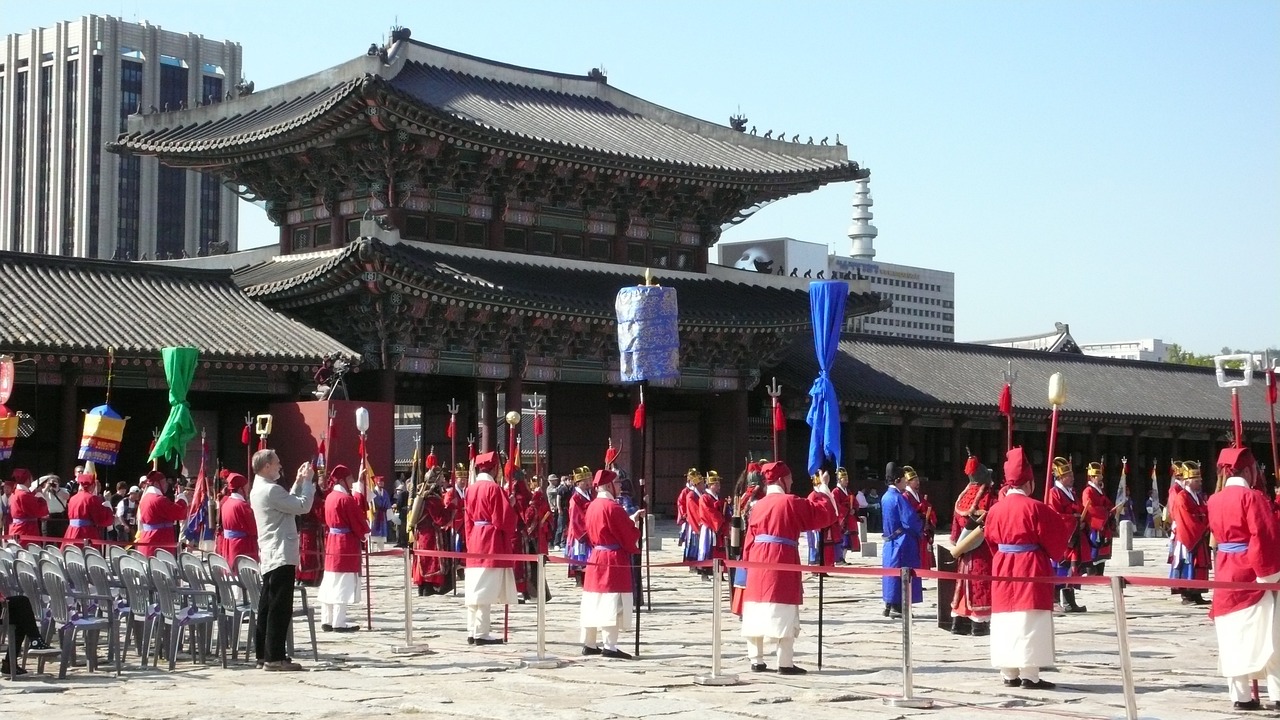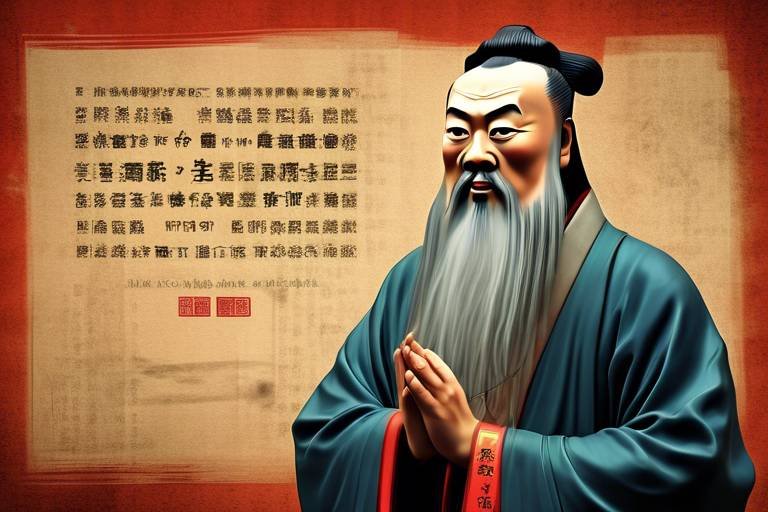Confucius: Philosophy and Impact on Asian Politics
Confucius, a name that resonates through the ages, is not just a historical figure; he is a beacon of wisdom that has shaped the political and social fabric of Asia for centuries. Born in 551 BCE in the state of Lu, in what is now modern-day China, Confucius lived during a time of great turmoil and fragmentation. The **Warring States period** was marked by chaos and conflict, which deeply influenced his philosophical outlook. His teachings, rooted in the pursuit of moral integrity and social harmony, have transcended time and continue to play a pivotal role in contemporary governance and societal norms across Asia.
At the heart of Confucian thought lies the belief that a well-ordered society is built upon the moral character of its individuals. This emphasis on ethics and virtue not only shaped the personal lives of individuals but also laid the groundwork for political structures that prioritize benevolence and responsibility. Confucius famously stated, "The man who moves a mountain begins by carrying away small stones," highlighting the significance of incremental change and personal development in achieving broader societal goals. His ideas have permeated various aspects of life, influencing everything from family dynamics to government policies.
As we delve deeper into the life of Confucius, we uncover the richness of his teachings and their enduring impact on Asian politics. Through his focus on values such as **filial piety**, righteousness, and the importance of education, Confucius established principles that resonate with many cultures today. In this article, we will explore the core tenets of Confucianism, its historical roots, and its implications for modern governance, as well as the critiques that have emerged over time. Join us on this journey to understand how the philosophy of Confucius continues to shape the political landscape of Asia.
Confucius was born into a time of significant social upheaval. His early years were marked by poverty, but he was fortunate enough to receive an education, which was a privilege not afforded to many during his time. This education instilled in him a love for learning and a desire to understand the world around him. As he grew older, Confucius became increasingly aware of the societal issues plaguing his homeland. His experiences led him to develop a philosophy that emphasized the importance of morality, respect, and social harmony.
Throughout his life, Confucius traveled from state to state, sharing his ideas and seeking to influence rulers with his teachings. However, he faced significant challenges and often found himself at odds with the political elite. Despite these obstacles, his teachings gained followers and laid the groundwork for what would become one of the most influential philosophies in Asia. Confucius' legacy is not merely a collection of teachings; it is a living tradition that continues to evolve and adapt to contemporary challenges.
At the core of Confucianism are several fundamental principles that guide moral behavior and societal structure. These principles include **filial piety**, righteousness, and the importance of education. Filial piety, or respect for one's parents and ancestors, is perhaps the most significant of these concepts. It forms the foundation of family relationships and societal expectations in many Asian cultures. Righteousness emphasizes the importance of moral integrity and ethical behavior, while education is viewed as a crucial tool for personal and societal development.
Filial piety is not just a concept; it is a way of life in Confucianism. It dictates how individuals interact within families and society at large. The significance of filial piety extends beyond mere respect for parents; it encompasses a broader sense of duty and loyalty to family and community. In many Asian cultures, this principle shapes family structures and societal expectations, creating a strong sense of interdependence among generations.
In societies influenced by Confucianism, family dynamics are often characterized by respect for elders and a strong sense of obligation towards family members. Children are taught to honor their parents and maintain familial ties, fostering a culture of support and responsibility. This emphasis on family can be seen in various traditions and rituals, where familial bonds are celebrated and reinforced. The implications of filial piety extend to how families make decisions, allocate resources, and navigate conflicts, creating a framework for harmonious living.
Interestingly, the principle of filial piety also extends to governance. In Confucian thought, rulers are viewed as parental figures who must act with benevolence and care towards their subjects. This creates a system of loyalty and respect that is expected from both the governed and those in power. In many Asian political systems, this principle has influenced the relationship between leaders and citizens, fostering an environment where ethical leadership is paramount. The expectation is that leaders should embody the virtues of a good parent, prioritizing the well-being of their people above personal gain.
Confucius placed immense importance on education as a means for personal and societal improvement. He believed that education was not merely about acquiring knowledge but about cultivating moral character and ethical behavior. This belief has had a lasting impact on educational systems across Asia, where academic achievement is highly valued and viewed as a pathway to success. The Confucian ideal of the "gentleman" or "junzi" emphasizes the importance of continuous learning and self-improvement, encouraging individuals to strive for excellence in all aspects of life.
Historically, Confucian ideals have significantly influenced political structures and leadership styles in various Asian nations. The concept of the **benevolent ruler** is central to Confucian governance, where leaders are expected to act with moral integrity and prioritize the welfare of their subjects. This principle has shaped political discourse and governance practices, fostering a culture of accountability and ethical leadership.
Benevolent leadership, as defined by Confucianism, is characterized by compassion, wisdom, and a commitment to the common good. Modern political leaders in Asia often draw inspiration from this concept, striving to embody the virtues of a benevolent ruler. This approach to leadership emphasizes the importance of serving the people and making decisions that promote social harmony and well-being.
In recent years, there has been a resurgence of Confucian values in contemporary Asian political discourse. As societies grapple with rapid modernization and globalization, many leaders are looking back to Confucian principles for guidance. This revival has implications for governance and policy-making, as Confucian ideals are integrated into discussions about social justice, ethical leadership, and community welfare.
Despite its many contributions, Confucianism is not without its critiques. Some argue that its emphasis on hierarchy and collectivism can stifle individualism and personal freedom. Critics also point out that Confucianism's traditional views on gender roles can perpetuate inequality. However, supporters argue that the core values of Confucianism can be adapted to promote a more inclusive and equitable society. The ongoing dialogue around Confucianism reflects the dynamic nature of its philosophy and its ability to evolve in response to contemporary challenges.
- What is the main idea of Confucianism? Confucianism emphasizes the importance of moral integrity, social harmony, and the cultivation of virtue through education.
- How does Confucianism influence modern politics? Confucian values, such as benevolent leadership and filial piety, continue to shape governance and societal norms in many Asian countries.
- What are the critiques of Confucianism? Critics argue that Confucianism can promote hierarchical structures and limit individual freedom, though supporters advocate for its adaptability in modern contexts.

The Life of Confucius
Confucius, known in Chinese as Kong Fuzi, was born in 551 BCE in the state of Lu, located in present-day Shandong province. His early life was marked by the tumultuous socio-political environment of the time, which was characterized by the fragmentation of power among various feudal lords. This chaotic backdrop would deeply influence his philosophical outlook. Growing up in a modest family, Confucius faced numerous challenges, including the loss of his father at a young age, which instilled in him a profound understanding of hardship and resilience.
As a young man, Confucius was eager to learn and pursued education with a fervor that would later shape his teachings. He studied various subjects, including music, poetry, history, and ethics, which laid the foundation for his philosophical inquiries. His commitment to education and self-improvement was not just a personal endeavor; it became a cornerstone of his philosophical teachings. Confucius believed that education was essential for moral development and societal harmony, a principle that resonates through Asian cultures even today.
After years of study, Confucius began his career as a teacher, attracting a diverse group of students eager to learn from his insights. His teachings emphasized the importance of virtue, moral integrity, and respect for tradition. However, his ideas were not immediately embraced by the ruling elites of his time. In fact, Confucius faced significant opposition and was often marginalized in political circles. Despite these challenges, he remained steadfast in his beliefs and continued to teach and spread his philosophy.
In his later years, Confucius traveled to various states in China, seeking to apply his teachings in governance and advising rulers on how to cultivate a just and harmonious society. He advocated for the concept of the "junzi," or "gentleman," who embodied moral integrity and ethical leadership. His vision for a well-ordered society was based on the idea that rulers should be virtuous and lead by example, fostering loyalty and respect among their subjects.
Confucius' life was not without its hardships. He experienced periods of exile and disappointment, particularly when his ideas were rejected by those in power. However, his resilience and dedication to his philosophy left an indelible mark on Chinese society and beyond. After his death in 479 BCE, his teachings were compiled by his disciples into texts such as the "Analects," which continue to influence not only philosophical thought but also political ideologies across Asia.
Today, the legacy of Confucius is celebrated not just in China but throughout the world. His thoughts on morality, ethics, and governance have transcended time and continue to inspire leaders and thinkers. The values he championed, such as respect for family, the importance of education, and the pursuit of virtue, remain integral to many Asian cultures, shaping societal norms and political structures.

Core Principles of Confucianism
Confucianism, a philosophy that has profoundly shaped Asian cultures, is grounded in several core principles that aim to cultivate moral integrity and social harmony. At its heart lies the idea that human relationships form the foundation of a well-ordered society. Confucius believed that by nurturing personal virtues and ethical conduct, individuals could contribute to a greater good, thereby fostering a stable community. Some of the key principles include filial piety, righteousness, and the importance of education.
One of the most significant concepts in Confucianism is filial piety, which emphasizes respect and devotion to one's parents and ancestors. This principle is not merely about obedience; it encompasses a deep sense of gratitude and responsibility towards family. In Confucian thought, the family is seen as a microcosm of society, and the relationships within it mirror the broader social order. When individuals uphold filial piety, they contribute to a harmonious social fabric where respect and care for others are paramount.
Another cornerstone of Confucianism is righteousness or yi, which refers to the moral disposition to do what is right, even at a personal cost. This principle teaches individuals to act with integrity and uphold justice. In many ways, righteousness serves as a guiding light for personal behavior, influencing how one interacts with others and makes decisions. Confucius argued that a society led by righteous individuals would naturally flourish, as ethical leaders inspire their followers to act virtuously.
Moreover, Confucius placed immense value on education. He believed that education is a powerful tool for personal and societal transformation. According to Confucian thought, learning is not just about acquiring knowledge; it is about cultivating moral character and understanding one's role in the world. Confucius famously stated, “Is it not a joy to have friends come from afar? Is it not a joy to learn and practice what you have learned?” This highlights the belief that education fosters relationships and enhances social cohesion.
In summary, the core principles of Confucianism—filial piety, righteousness, and the importance of education—intertwine to create a framework for ethical behavior and governance. These principles encourage individuals to reflect on their actions and their impact on society. By promoting personal virtue and social responsibility, Confucianism continues to resonate in contemporary Asian cultures, influencing everything from family dynamics to political ideologies.
- What is the significance of filial piety in Confucianism?
Filial piety is essential in Confucianism as it promotes respect and responsibility towards one's family, which is seen as the foundation of a harmonious society.
- How does Confucianism influence modern education?
Confucianism emphasizes the moral and ethical dimensions of education, encouraging a holistic approach that goes beyond mere academic achievement.
- Can Confucian principles be applied in contemporary politics?
Yes, many Asian countries are witnessing a resurgence of Confucian values in governance, promoting ethical leadership and social responsibility.

Filial Piety in Confucian Thought
Filial piety, or xiao (孝), is a cornerstone of Confucian philosophy that emphasizes respect, loyalty, and devotion to one's parents and ancestors. This principle is not just a familial obligation; it is seen as a moral compass that guides individuals in their interactions with others and society at large. In Confucian thought, filial piety embodies the essence of ethical behavior and social harmony. It suggests that by honoring our parents and elders, we contribute to the stability and well-being of the entire community. But why is this concept so vital in Asian cultures?
To understand the significance of filial piety, we must delve into its implications for family dynamics and societal expectations. In many Asian societies influenced by Confucianism, family is the foundational unit of social structure. The relationships within a family are often hierarchical, with elders occupying a position of authority and respect. This hierarchy is not just a cultural norm; it's a reflection of the deep-seated belief that wisdom and experience come with age. Consequently, children are expected to care for their parents as they age, ensuring their well-being and comfort. This expectation fosters a sense of responsibility and gratitude, creating a cycle of respect that reinforces familial bonds.
Moreover, filial piety extends beyond the immediate family. It permeates societal interactions, influencing how individuals perceive authority figures and leaders. In Confucian thought, the respect shown to parents is mirrored in the respect afforded to government officials and rulers. This creates a societal framework where loyalty and obedience are valued, which can be both a strength and a limitation. While this principle promotes social order and cohesion, it can also lead to unquestioning acceptance of authority, raising questions about individual agency and critical thinking.
To illustrate the importance of filial piety, let's consider a few key aspects:
- Emotional Bonds: Filial piety fosters deep emotional connections within families, creating a nurturing environment where children feel valued and supported.
- Social Responsibility: It instills a sense of duty in children to care for their parents, which enhances community ties and intergenerational support.
- Cultural Identity: Filial piety is a significant part of cultural heritage in many Asian societies, shaping values and traditions that are passed down through generations.
In conclusion, filial piety in Confucian thought is much more than a simple obligation; it is a vital principle that shapes family dynamics and societal norms. As we navigate the complexities of modern life, this ancient concept continues to resonate, reminding us of the importance of respect, responsibility, and the enduring bonds of family. The challenge lies in balancing these traditional values with the evolving perspectives of individualism and personal freedom in contemporary society.
- What is filial piety? Filial piety refers to the respect, loyalty, and devotion that children owe to their parents and ancestors, as emphasized in Confucian philosophy.
- Why is filial piety important in Asian cultures? It is considered a foundational principle that promotes family harmony, social responsibility, and respect for authority.
- How does filial piety affect family dynamics? It creates a hierarchical structure within families, where elders are respected and cared for, fostering strong emotional bonds and intergenerational support.
- Can filial piety coexist with individualism? This is a complex issue, as balancing traditional values with modern individualistic perspectives can lead to tensions in family and societal relationships.

Impact on Family Dynamics
When we delve into the heart of Confucianism, we discover that its principles have a profound impact on family dynamics, shaping relationships and societal structures across Asia. At the core of Confucian thought is the concept of filial piety, which emphasizes respect, loyalty, and care for one's parents and ancestors. This principle is not just a moral guideline; it serves as the backbone of family interactions and responsibilities. In many Asian cultures, children are expected to honor their parents not only through obedience but also by ensuring their well-being in old age, creating a cycle of respect that transcends generations.
In a typical Confucian family, the hierarchy is clear. The eldest male often holds authority, and this structure reinforces a sense of order and responsibility. This hierarchical system can be likened to a well-tuned orchestra, where every member plays a specific role, contributing to the harmony of the whole. The roles within the family are not merely about authority; they are about duty and respect, and this creates a strong sense of belonging and identity within the family unit.
However, this emphasis on hierarchy and duty can lead to some challenges. For instance, the pressure to conform to familial expectations can sometimes stifle individual aspirations. Young adults may feel torn between pursuing their dreams and fulfilling the obligations imposed by their families. This tension can create a complex web of emotions, where love and duty often clash. In this light, Confucianism can be seen as both a guiding light and a heavy burden, shaping family interactions in profound ways.
Moreover, the implications of filial piety extend beyond just family life; they seep into the fabric of society. In Confucian-influenced cultures, the family is often viewed as the fundamental unit of society. This perspective fosters a communal approach to living, where individual actions are considered in the context of their impact on the family and, by extension, the community. The idea of collectivism is deeply rooted here, where personal achievements are often celebrated as family achievements, reinforcing the interconnectedness of family and society.
In summary, the impact of Confucianism on family dynamics is multifaceted. It creates a framework for respect and responsibility, fostering strong intergenerational bonds while also posing challenges in terms of individual freedom. As we navigate these complexities, it’s important to recognize how these values continue to shape not only family life but also the broader societal norms in Confucian-influenced cultures.
- What is the main idea of filial piety in Confucianism? Filial piety emphasizes respect and care for one's parents and ancestors, shaping family relationships and societal expectations.
- How does Confucianism influence family roles? Confucianism promotes a hierarchical family structure where roles are clearly defined, often placing the eldest male in a position of authority.
- Are there challenges associated with Confucian family values? Yes, the pressure to conform to familial expectations can sometimes conflict with individual aspirations, creating emotional tension.
- How does Confucianism affect societal norms? The emphasis on family as the fundamental unit of society fosters a collectivist approach, where individual actions are viewed in relation to their impact on the family and community.

Filial Piety and Governance
Filial piety, a cornerstone of Confucian thought, extends far beyond the family unit; it permeates the very fabric of governance in Confucian-influenced societies. This principle emphasizes respect and loyalty towards one's parents and elders, which naturally translates into a broader respect for authority figures within the political realm. In cultures steeped in Confucian values, the idea of governance is often viewed through the lens of familial relationships. Just as children owe respect and obedience to their parents, citizens are expected to show deference to their leaders. This creates an intricate web of loyalty that binds the people to their rulers, fostering a sense of stability and order.
In practical terms, the implications of filial piety on governance can be observed in various ways. For instance, leaders are often expected to embody the virtues of a benevolent parent, providing for their citizens and ensuring their well-being. This expectation shapes the very nature of leadership, where the ruler is seen not merely as a political authority but as a paternal figure. In this context, governance becomes a moral obligation, where leaders must act with integrity and compassion, reflecting the nurturing qualities associated with familial roles.
Furthermore, the concept of loyalty, deeply rooted in filial piety, influences how citizens engage with their government. In many Asian cultures, questioning authority is often viewed as a breach of familial duty. This cultural norm can lead to a more harmonious society, where citizens are less likely to challenge their leaders openly. However, it can also create challenges, particularly when governance falls short of the people’s expectations. When leaders fail to act in the best interests of their citizens, the very foundation of loyalty can be tested, leading to social unrest or calls for reform.
To illustrate this relationship between filial piety and governance, consider the following table that highlights key aspects:
| Aspect | Filial Piety | Governance |
|---|---|---|
| Respect | Children respect parents | Citizens respect leaders |
| Loyalty | Obedience to family | Loyalty to the state |
| Responsibility | Care for elders | Leaders care for citizens |
| Virtue | Parents model virtue | Leaders embody virtue |
In conclusion, filial piety does not merely shape family dynamics; it lays the groundwork for a unique governance model that fosters loyalty and respect towards authority. This intertwining of personal relationships and political structures is a defining characteristic of many Asian societies, highlighting the enduring legacy of Confucian philosophy in contemporary governance. As we navigate the complexities of modern political landscapes, understanding the role of filial piety in governance becomes essential for comprehending the nuances of leadership and citizen engagement in these cultures.
- What is filial piety? Filial piety refers to the respect, loyalty, and duty that children owe to their parents and elders, a key concept in Confucianism.
- How does filial piety influence governance? It creates a framework where citizens are expected to show loyalty and respect towards their leaders, mirroring familial relationships.
- What are the implications of filial piety on political stability? While it can foster harmony and stability, it may also suppress dissent, leading to challenges when leaders fail to meet citizens' expectations.
- Can filial piety coexist with democratic values? Yes, but it often requires a delicate balance between respect for authority and the right to question leadership.

The Role of Education
Education holds a **sacred place** in the teachings of Confucius, serving as the bedrock upon which moral character and societal harmony are built. Confucius believed that education was not merely about acquiring knowledge; it was a transformative journey that shaped individuals into virtuous members of society. He famously stated, “Is it not a joy to have friends come from afar? Is it not a joy to learn and practice what you have learned?” This highlights the joy and responsibility that comes with education, emphasizing its role in personal development.
In Confucian thought, education is a lifelong pursuit, and its impact extends beyond the individual to the greater community. The **importance of education** can be summarized in several key aspects:
- Moral Development: Education is seen as a means to cultivate virtue. Confucius taught that through learning, individuals develop qualities such as righteousness, integrity, and respect for others.
- Social Responsibility: An educated person is expected to contribute to society. Confucius believed that knowledge comes with the duty to serve one's community and uphold social harmony.
- Leadership Preparation: Education is vital for those who aspire to leadership roles. Confucius argued that a good ruler must be well-educated to govern wisely and compassionately.
Moreover, the emphasis on education in Confucianism has led to the establishment of various educational institutions throughout Asia, where the teachings of Confucius are integrated into curricula. For instance, in countries like **China**, **Korea**, and **Japan**, Confucian academies have historically played a crucial role in shaping the moral and intellectual fabric of society. These institutions not only focus on academic excellence but also instill a sense of ethical responsibility in students.
Today, the legacy of Confucian education can still be felt. Many Asian countries continue to prioritize education, viewing it as a pathway to **economic prosperity** and **social mobility**. In fact, the **Asian educational model** often emphasizes rigorous study, respect for teachers, and a strong focus on family values. This model reflects the deep-rooted belief in the transformative power of education, echoing Confucian ideals.
However, it is essential to recognize that the Confucian approach to education is not without its challenges. Critics argue that the intense pressure to succeed can lead to stress and a lack of creativity among students. Additionally, the focus on rote memorization may overshadow the development of critical thinking skills. As we move forward in the 21st century, the challenge lies in balancing traditional Confucian values with the need for innovation and adaptability in education.
In conclusion, the role of education in Confucianism is multifaceted and deeply ingrained in Asian cultures. It serves as a tool for moral development, social responsibility, and leadership preparation, impacting not only individuals but also the broader society. As we reflect on Confucian teachings, we are reminded that education is not just about acquiring knowledge; it is about nurturing the virtues that bind us together as a community.
- What is the main focus of Confucian education? Confucian education emphasizes moral development, social responsibility, and preparation for leadership.
- How does Confucianism influence modern educational systems? Confucian values continue to shape educational practices in many Asian countries, stressing discipline, respect for teachers, and academic excellence.
- Are there critiques of the Confucian approach to education? Yes, critics point to issues such as excessive pressure on students and a potential lack of emphasis on critical thinking skills.

Confucianism and Governance
Confucianism has played a pivotal role in shaping the political landscape of Asia for centuries. Its ideals are deeply woven into the fabric of governance, influencing everything from leadership styles to the relationship between rulers and their subjects. At the heart of Confucian thought lies the belief that a harmonious society can only be achieved through moral governance. This means that leaders must not only be wise and capable but also virtuous and benevolent. The concept of the 'benevolent ruler' is central to Confucianism, suggesting that a ruler's legitimacy is derived from their ability to act in the best interests of the people.
Historically, Confucianism has been a guiding force in the political structures of various Asian nations. It emphasizes the importance of hierarchy and order, where each individual has a defined role within society. This has led to a governance model that prioritizes stability and collective well-being over individual rights. In Confucian-influenced societies, the idea of loyalty to authority is paramount, as it fosters a sense of duty and respect among citizens. This loyalty is not blind; rather, it is contingent upon the ruler's moral integrity and ability to provide for the populace.
Moreover, Confucianism encourages a participatory form of governance, where the input of educated individuals is valued. Confucius himself advocated for the selection of leaders based on merit rather than birthright, which laid the groundwork for civil service exams in imperial China. This system aimed to cultivate a class of scholar-officials who would govern with wisdom and virtue, thereby ensuring that the interests of the people were prioritized. Today, this emphasis on education remains relevant, as many Asian countries continue to value academic achievement as a pathway to political influence.
In contemporary politics, there has been a resurgence of Confucian values, with many leaders invoking these principles to legitimize their rule. This revival is often seen as a response to the challenges of modern governance, where traditional values are viewed as a means to restore social harmony and national identity. For instance, in countries like China and South Korea, Confucian ideals are being integrated into policy-making processes, reflecting a desire to balance modernity with cultural heritage.
However, the influence of Confucianism on governance is not without its critiques. While it promotes stability and moral leadership, it can also perpetuate hierarchical structures that limit individual freedoms and discourage dissent. Critics argue that such a system may hinder democratic development and promote authoritarianism. Nevertheless, the enduring legacy of Confucianism in governance serves as a reminder of the intricate relationship between philosophy and politics in shaping societal norms and government practices across Asia.
- What is the role of education in Confucianism? Education is seen as a vital tool for personal and societal improvement, emphasizing moral development and the cultivation of virtue.
- How does Confucianism influence modern Asian politics? Confucian values are increasingly invoked by contemporary leaders to promote social harmony and national identity, integrating traditional principles into modern governance.
- What are the critiques of Confucianism in governance? Critics argue that Confucianism can reinforce hierarchical structures and limit individual freedoms, potentially hindering democratic processes.

Benevolent Leadership
Benevolent leadership is a cornerstone of Confucian philosophy, emphasizing the moral responsibility of leaders to act with compassion and integrity. This concept is not just about wielding power; it’s about nurturing the welfare of the people. Confucius believed that a ruler should be like a father to his subjects, guiding them with wisdom and ensuring their well-being. This analogy paints a vivid picture of the ideal relationship between leaders and their citizens, where the former is expected to prioritize the needs and happiness of the latter.
The essence of benevolent leadership can be broken down into several key attributes:
- Empathy: A benevolent leader understands the struggles of their people and strives to alleviate their hardships.
- Integrity: Trustworthiness is paramount; leaders must be honest and transparent in their actions.
- Wisdom: Making decisions that benefit the collective requires a deep understanding of societal dynamics.
- Servitude: Leaders should view their role as one of service, putting the needs of the community before their own ambitions.
This leadership style has historically influenced various Asian nations, shaping the expectations of political figures. For instance, in countries like China and Korea, the notion of a 'benevolent ruler' remains deeply embedded in the political culture. Leaders are often judged not just by their policies but by their moral character and ability to connect with the populace. The legacy of Confucianism provides a framework for evaluating leadership effectiveness, where the ultimate goal is to foster a harmonious society.
In modern times, the relevance of benevolent leadership is evident as political leaders across Asia grapple with issues such as corruption, inequality, and social unrest. The call for leaders to embody benevolence has never been more critical. Citizens are increasingly demanding accountability and compassion from their leaders, reflecting a shift towards a governance model that prioritizes the common good. This resurgence of Confucian values in contemporary politics is not merely a nostalgic return to the past; it is a necessary evolution to address the complexities of modern governance.
Moreover, the implications of benevolent leadership extend beyond politics into the broader societal framework. When leaders exemplify these values, they set a standard for behavior that permeates through all levels of society. This can lead to a ripple effect, encouraging citizens to act with kindness and responsibility towards one another. In essence, benevolent leadership cultivates a culture of mutual respect and cooperation, which is vital for the stability and progress of any nation.

Confucianism in Contemporary Politics
In today's fast-paced world, it might seem surprising that ancient philosophies like Confucianism still hold significant sway over political landscapes in Asia. Yet, the principles laid down by Confucius over two millennia ago resonate strongly in modern governance, particularly in countries like China, South Korea, and Japan. Why is this the case? The answer lies in the deep-rooted cultural values that continue to influence political thought and behavior.
Confucianism emphasizes harmony, respect for authority, and the importance of moral leadership. These ideals are not just relics of the past; they are actively integrated into contemporary political discourse. For instance, the concept of the 'benevolent ruler'—a leader who prioritizes the welfare of the people—is a tenet that many modern politicians aspire to embody. This notion creates a framework where leaders are expected to act with integrity and care for their constituents, fostering a sense of loyalty and trust. In fact, many political campaigns in Asia today echo Confucian ideals, promoting candidates as moral exemplars who can restore harmony and order.
Moreover, Confucianism's focus on education and self-cultivation remains relevant. Current educational reforms in various Asian countries often reflect Confucian values, aiming to produce not just skilled workers but also responsible citizens who understand their roles within society. This educational philosophy contributes to a political climate where informed and engaged citizens can hold their leaders accountable. The emphasis on education also manifests in the rigorous civil service examinations seen in places like China, where candidates are evaluated not only on technical skills but also on their understanding of Confucian texts and ethical governance.
However, the resurgence of Confucianism in contemporary politics is not without its challenges. Critics argue that it can reinforce hierarchical structures that may stifle individualism and dissent. In some cases, political leaders may exploit Confucian ideals to consolidate power rather than promote genuine benevolence. This has led to a complex relationship between tradition and modernity, where the wisdom of Confucius is sometimes overshadowed by the realities of political maneuvering.
To better understand the impact of Confucianism on contemporary politics, let's take a look at how it manifests in various Asian nations:
| Country | Confucian Influence | Examples in Politics |
|---|---|---|
| China | Strong emphasis on moral governance | Promotion of 'socialism with Chinese characteristics' |
| South Korea | Focus on education and respect for authority | Political campaigns emphasizing family values |
| Japan | Harmony and consensus in decision-making | Consensus-based politics and community engagement |
As we navigate through the complexities of contemporary governance, it becomes evident that Confucianism continues to shape political ideologies and practices across Asia. The dialogue between ancient wisdom and modern challenges is ongoing, prompting us to reflect on how these age-old principles can be adapted to meet the needs of today's societies.
- What is Confucianism? Confucianism is a philosophical system based on the teachings of Confucius, emphasizing morality, family loyalty, and respect for authority.
- How does Confucianism influence modern politics? It influences modern politics by promoting ideals such as benevolent leadership, moral governance, and the importance of education.
- Are there critiques of Confucianism in contemporary society? Yes, critiques often focus on its potential to reinforce hierarchical structures and limit individual expression.

Critiques of Confucianism
While Confucianism has undeniably shaped the moral and political landscape of Asia for centuries, it's not without its critics. Many argue that its teachings can sometimes stifle individualism and promote rigid hierarchical structures that may not align with modern democratic ideals. Critics often point out that the emphasis on filial piety and loyalty to authority can create environments where dissent is discouraged, leading to a culture of conformity rather than innovation. This can be particularly problematic in a rapidly changing world where adaptability and critical thinking are essential.
One of the most significant critiques revolves around the notion of hierarchy. Confucianism inherently values relationships based on rank and status, which can perpetuate inequality. For instance, in a traditional Confucian society, the elder is always revered, and their decisions are seldom questioned. This can lead to a stagnation of ideas, as younger generations may feel pressured to conform to the wisdom of their elders rather than express their own perspectives or challenge outdated norms. In essence, while respect for elders is a beautiful sentiment, it can sometimes morph into a barrier against progress.
Moreover, the focus on collectivism over individual rights can be seen as a double-edged sword. On one hand, it fosters a strong sense of community and belonging, which is vital in many Asian cultures. On the other hand, it can undermine personal freedoms and the pursuit of individual aspirations. In societies where Confucian values dominate, personal ambitions may often be sacrificed for the sake of family honor or societal expectations, which can lead to a sense of unfulfillment among individuals.
To illustrate this point, consider the following table that highlights some of the key critiques of Confucianism:
| Critique | Description |
|---|---|
| Stifling Individualism | Emphasis on conformity can suppress personal expression and innovation. |
| Hierarchical Structures | Promotes inequality and can hinder progress by discouraging dissent. |
| Collectivism vs. Individual Rights | Prioritizes community over personal aspirations, leading to potential unfulfillment. |
Additionally, some scholars argue that Confucianism may not adequately address contemporary social issues such as gender equality. The traditional roles prescribed by Confucian teachings often place women in subordinate positions, which can hinder their participation in society and politics. This is a critical concern in a world striving for equality and inclusivity. As societies evolve, there is a growing demand for philosophies that embrace more egalitarian principles, which some view as a limitation of Confucian thought.
In conclusion, while Confucianism offers valuable insights into ethics and governance, it is essential to recognize its critiques. As we navigate the complexities of modern society, it becomes increasingly important to adapt these ancient teachings to align with contemporary values that promote individual rights, equality, and innovation. The challenge lies in finding a balance between respecting tradition and embracing progress, ensuring that Confucianism can evolve to meet the needs of future generations.
- What is Confucianism? Confucianism is a philosophical and ethical system based on the teachings of Confucius, emphasizing morality, family loyalty, and respect for hierarchy.
- How does Confucianism influence modern politics? Confucian ideals continue to shape governance in Asia, promoting values like benevolent leadership and social harmony.
- What are the main critiques of Confucianism? Critics argue that Confucianism can stifle individualism, reinforce hierarchical structures, and may not adequately support gender equality.
Frequently Asked Questions
- What is Confucianism?
Confucianism is a philosophical and ethical system based on the teachings of Confucius, focusing on morality, family loyalty, respect for elders, and the importance of education. It emphasizes the role of individuals in contributing to a harmonious society.
- How did Confucius influence Asian politics?
Confucius profoundly impacted Asian politics by promoting the idea of a 'benevolent ruler' who governs with moral integrity and prioritizes the welfare of the people. His teachings have shaped political structures and leadership styles across various Asian nations.
- What are the core principles of Confucianism?
The core principles of Confucianism include filial piety, righteousness, integrity, and the importance of education. These values guide personal behavior and societal norms, influencing family dynamics and governance.
- What is filial piety, and why is it important?
Filial piety is a key concept in Confucianism that emphasizes respect and duty towards one's parents and ancestors. It is crucial in maintaining family structures and societal expectations, fostering harmony and stability within communities.
- How does Confucianism view education?
Confucianism places a high value on education as a means of personal and societal improvement. It is seen as essential for cultivating moral character and preparing individuals to contribute positively to society.
- What critiques exist regarding Confucianism?
Critics argue that Confucianism may limit individualism and reinforce hierarchical structures within society. Some believe it can hinder social mobility and promote conformity over personal expression.
- Is Confucianism still relevant today?
Yes, Confucianism continues to be relevant in contemporary politics and society, with many Asian countries experiencing a resurgence of Confucian values in governance and public life, influencing policies and leadership approaches.



















